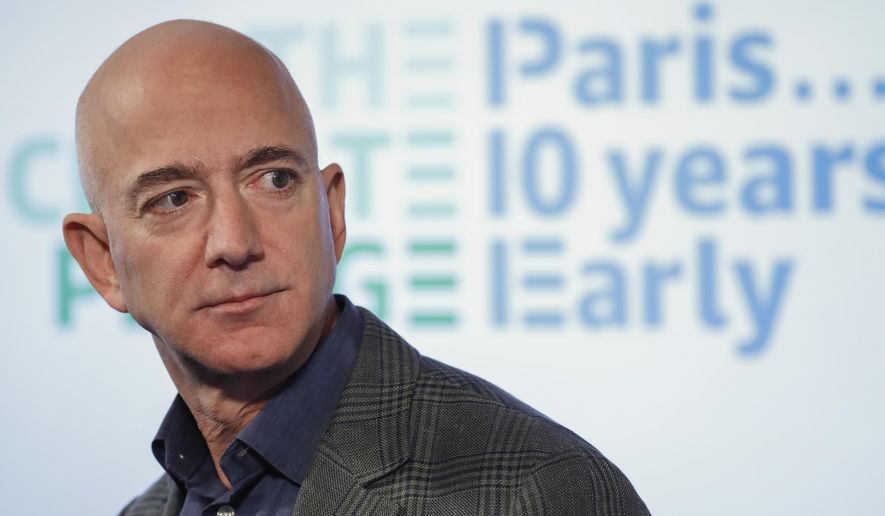OPINION:
Fifty years ago, The Washington Post broke the Watergate Scandal. Now the same paper that gave journalism a finest hour has contributed one of its foulest, falsely reporting that President Trump ordered Georgia’s lead elections investigator to “find the fraud” and promising she’d be a “national hero” if she did.
Two months after publication, The Post admitted (sorry, “acknowledged”) that those were made-up quotes by phantom sources when audio of the call surfaced. The “correction” was as if they’d misspelled a name or goofed a date. No apology. No firings. Not even a promise to readers that they’ll do better in the future.
When Lee Iacocca took over Chrysler, he appeared in commercials to admit mistakes and promise the company had changed. It shouldn’t be too much to expect Jeff Bezos to restore faith in journalism that way, especially since making K-cars isn’t constitutionally protected as essential like a free press.
Simply removing the naughty bits is fine if you’re editor Winston Smith at the Ministry of Truth, tossing yesterday’s lies down the memory hole to make room for today’s. But is Orwell’s “1984” a J-school textbook?
Compare The Post’s handling of this scandal to the way it confronted Janet Cooke. In 1981, she won a Pulitzer Prize for a story about an 8-year-old heroin addict who didn’t exist. When exposed, none other than Bob Woodward, assistant managing editor, admitted “questions had been raised” in the newsroom “about the story not sounding right … anonymous sources … and purported lies.” Ms. Cooke was out; the Pulitzer went back. Today, inaccurate stories are treated as sport, like catching the New England Patriots in spygate. Most of us aren’t shocked or outraged, just gleeful. People on the right point at The Post and shout “Ha! Ha!” like bad boy Nelson Muntz from “The Simpsons,” just as those on the left did when Carl Cameron at Fox News Channel (my former employer) manufactured a quote by John Kerry in 2004.
The lack of contrition The Post resembles another infamous hoax: “The Hitler Diaries” of 1983. (No, Donald Trump isn’t Adolf Hitler; Nobody is.) The Sunday Times and Germany’s Stern ignored questions such as: Why did the 60 leather volumes bear the initials F.H. rather than A.H. for Adolf Hitler? When historian Lord Dacre expressed such reservations, Times owner Rupert Murdoch famously responded, “F—- Dacre. Publish.”
But Mr. Murdoch and Stern hadn’t fabricated the forged fuhrer fakes the way The Post did the Trump quotes, and in 2012 he told the Leveson inquiry into the ethics of the British press, “I take full responsibility for it. It was a major mistake and one I shall have to live with for the rest of my life.” Will we ever hear such a statement from Jeff Bezos or anyone at his paper?
All of us who’ve been duped by a false news story cringe at this sort of journalistic malpractice. A few times my late boss, Rush Limbaugh, shared information from an untrustworthy source someone emailed. When he did, he always apologized on air, saying it did him no good to be wrong, make things up or lie to his audience.
I don’t see what good ginning up that hit piece did to the Bezos paper. After all, Mr. Trump had already lost. In “Rocky IV,” Soviet boxer Ivan Drago may have said, “If he dies, he dies” of Apollo Creed, but he let his foe fall dead to the canvas. He didn’t sucker punch him on the way down.
There are dishonest people in any business. Boxing, automobiles, journalism. A good leader weeds them out, not just for the customers, but for the industry as a whole. I think of the dedicated reporters and producers who miss special family moments when news breaks, or wide-eyed interns inspired by “All the President’s Men.” Hoaxes, sloppiness and partisan hitjobs damage them, too.
For this reason, calling the “fake news” elements in media the “enemy of the people” always left me queasy. I’d think of the many fine journalists I worked with who get lumped in with the fakes by people uninterested in distinctions. (Certainly I heard this when I worked at Fox.) If you’ve ever had collective guilt applied to your religion, region, race or career, you know the feeling.
Jeff Bezos can afford to stay silent. But because of its Watergate legacy, The Washington Post has a unique opportunity to turn this scandal into something positive. It also has an obligation to see that journalists aren’t working in self-imposed, ideological darkness.
Because darkness, like it says on the paper’s masthead, is where democracy dies.
• Dean Karayanis is content producer for “The Rush Limbaugh Show” and host of “History Author Show” on iHeartRadio.




Please read our comment policy before commenting.